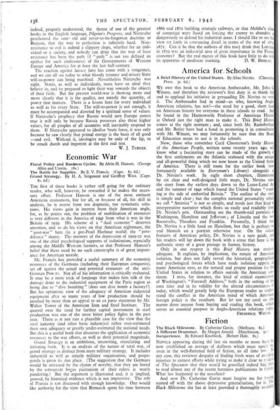Economic War
Fiscal Policy and Busioess Cycles. By Alvin H. Hansen. (George Allen and Unwin. x8s.)
The Battle for Supplies. By E. V. Francis. (Cape. 8s. 6d.)
THE first of these books is rather stiff going for the ordinary reader, who will, however, be rewarded if he makes the neces- sary effort. Professor Hansen is one of the most eminent American economists, but for all, or because of all, his skill in analysis, he is averse from too dogmatic, too systematic solu- tions. His views gain in interest from their American angle, for, as he points out, the problem of mobilisation of resources is very different in the America of 1941 from what it was in the Britain of 1939. His scheme of a " dual economy " deserves attention, and so do his views on that American nightmare, the " post-war " here (in a pre-Pearl Harbour world) the " post- defence " slump. The memory of the depression of 1919-21 was one of the chief psychological supports of isolationism, especially among the Middle Western farmers, so that Professor Hansen's belief that there need be no such catastrophe is of great. import-
' ance for American morale.
Mr. Francis has provided a useful summary of the economic resources of the Germans (including their European conquests), set off against the actual and potential resources of the anti- German Powers. Not all of his information is critically evaluated. It may be a mere trick of language that makes him talk of the damage done to the industrial equipment of the Paris region as being due to " dive bombing " (does one dive bomb a factory?). But his .optimistic view of the adequacy of American industrial equipment after so many years of low production should be justified by more than an appeal to an ex parte statement by Mr. Walter Tower of the American Iron and Steel Institute. The quarrel over the need for further capital investment in steel production was one of the most bitter policy fights in the past year. There is at any rate a plausible case for the view that the steel industry (and other basic industries) either over-estimated their own adequacy or greatly under-estimated the national needs. But this is a useful book that discusses the application of economic resources to the war efforts, as well as their potential magnitude.
Grand Strategy is an ambitious, interesting, stimulating and irritating book. It is an analysis of the nature of total war, of grand strategy as distinct from mere military strategy. It includes industrial as well as strictly military organisation, and propa- ganda is given its due place. (The suggestion that the Germans would be attracted by the charm of novelty, that they are bored by the retrograde bops ptiritanism of their rulers is worth pondering.) But the argument is illustrated and, it is implied, proved, by historical evidence which is not impressive. The role of Prussia is not discussed with enough knowledge. One would like authority for the view that Bismarck spent his time between 1866 and 187o building strategic railways, or that Moltke's pl of campaign were Eased on forcing the enemy to abandon dangerously to defend his industrial areas. I should like to see this view set forth in convincing detail in. terms of the war of 187o. 187r. Can it be that the authors of this tract think that Lorraine in 1870 was an industrial area of great importance in the French economy? But the real merits of this book have little to do with its apparatus of mediocre learning. D. W. BROGAN.


























 Previous page
Previous page